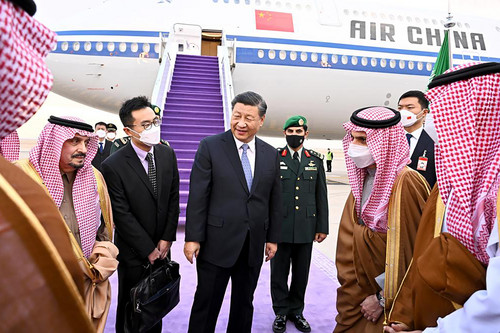| | |  | BY CALDER MCHUGH | Presented by TSMC | | 
Georgia Republican Senate nominee Herschel Walker greets supporters as his wife Julie Blanchard Walker looks on during a campaign stop in Marietta, Georgia. | Alex Wong/Getty Images | SACKED FOR A LOSS — So much for the Herschel Walker experiment. The celebrity former football star recruited and endorsed by former President Donald Trump failed to offer a compelling case in his bid to oust Georgia Democratic Sen. Raphael Warnock and fell short in Tuesday’s Senate runoff, marking the official end of a disappointing election cycle for the GOP. As it turns out, the first-time candidate’s campaign was plagued by problems from the start. There was public scandal: Walker reportedly paid for an abortion though he espoused pro-life views, and there were questions surrounding his principal residence . He also struggled to articulate his views or show a command of the issues. Behind the scenes, Walker’s staff were frustrated with Walker and his wife Julie — both political neophytes — and their understanding of Georgia’s political landscape. Natalie Allison conducted an early autopsy of Walker’s losing campaign and spoke with Nightly about what she found. Even though he won the Republican primary easily, the Walker campaign had issues for months. What were some of the problems that doomed him? There are the obvious issues, and those have been thoroughly documented. But beyond the scandals , the campaign operation was dealing with a clash between staff and Herschel Walker and his wife, Julie, about how to run things. It’s certainly not unusual for a candidate to take interest in the decision-making and provide input or require some level of accountability, but I heard similar stories from various levels of staff about being hamstrung, particularly by her. Everything from comms staffers being berated if they were seen talking to a reporter at a rally, or staff scheduling recommendations being ignored in favor of going to areas where they’d likely see little payoff. There’s no reason to think Herschel and Julie Walker didn’t mean well, but they probably had little-to-no business calling the shots on a major political campaign. On that note, you did some fascinating reporting about how Julie Walker hoped to win around 50 percent of the Black vote in Georgia, a level that would’ve been completely at odds with any reasonable historic performance. How did that sort of thinking affect the campaign’s strategy? Walker’s belief that he could win a sizable chunk of the Black vote in Georgia was part of his motivation to enter the race. He and Julie believed he was uniquely qualified to take on Warnock, a well-liked African American pastor. And that may have been true in theory — that Walker, a well-liked African American celebrity in Georgia who was also faith-minded — had a unique biography to challenge Warnock. As we all saw, it did not work out that way. But even a year into the race, when the couple were by then familiar with how a campaign works, demographic data, the concept that you can only invest so much time and money into a particular path to victory, Julie was still insistent that her husband could and should be making sweeping gains among Black voters, people involved with the campaign told me. Sometimes staff pushed back, and sometimes they just gave in, adding stops in Democratic strongholds with larger Black communities. You mention staff pushing back. What were some specific frustrations of Walker’s staff? From a reporter’s perspective, this dynamic is tricky to talk about. It sounds rather cliché to just say, “oh, it was all the wife’s fault.” Of course the buck didn’t stop at the candidate’s wife. But that was largely how staffers on the campaign said they felt. If Walker had a bad idea, they could usually move past it pretty easily and he wouldn’t push it. But they said Julie was much less likely to take “no” for an answer. It also seemed like Walker’s personality and genuine interest in staffers and their families made him easy for them to like. They just didn’t get along as well with his wife, I was told. Again, some of this seems cliché and sexist, but these were widely held opinions among people involved with the team. Is it possible that the problem was less with this infighting — including how and where the campaign stops were distributed — and more with Walker’s quality as a candidate? Yeah, let’s be clear. Walker’s campaign schedule was not his undoing. It illustrates some of his strategy missteps as a political novice and provides some insight into his problematic campaign operation. His downfall, as I quoted a person very close to the campaign saying, was that he was unprepared to run for this level of office and made everything more difficult for himself, his staff and other allies by not being forthcoming about what was in his past. And in conversations with those people, many of them truly believe Walker just didn’t understand how closely he would be scrutinized, how brutal campaigns are, and how damning details from his past were going to be brought to light either way. Welcome to POLITICO Nightly. Reach out with news, tips and ideas at nightly@politico.com . Or contact tonight’s author at cmchugh@politico.com or on Twitter at @calder_mchugh .
| |
| | A message from TSMC: TSMC is proud to share that in addition to its first fab in Arizona, which is scheduled to begin production of N4 process technology in 2024, the company has also started the construction of a second fab which is scheduled to begin production of 3nm process technology in 2026. The overall investment for these two fabs will be approximately US$40 billion, one of the largest foreign direct investments in the history of the United States. | | | | | POWER PLAY — The Senate GOP’s upstarts aren’t done yet, writes Burgess Everett . About a half-dozen Republican senators, most of whom publicly opposed Mitch McConnell as their leader last month, are getting more organized in a bid to exert their leverage . They’re pushing their colleagues for a formal legislative agenda and to extract more concessions from Democrats, according to multiple senators and aides. These GOP senators have been quietly meeting on a regular basis to strategize future battles worth picking within McConnell’s ranks, and they’re set to call a special conference meeting next week to start a broader debate within the Republican conference. It’s not the same sort of rebellion Kevin McCarthy is facing in the House as he tries to claim the speakership. But it’s a clear sign that the restive group of Senate Republicans isn’t going away just because their leadership fight with McConnell is over. “Democrats have done a pretty good job of picking issues that motivate their base and that have wider support among the public,” said Sen. Lindsey Graham (R-S.C.), who voted against McConnell last month. “We need to be doing the same thing. I think a lot of people in the Republican Party don’t see us doing it as emphatically as Democrats.”
| |
| | A NEW POLITICO PODCAST: POLITICO Tech is an authoritative insider briefing on the politics and policy of technology. From crypto and the metaverse to cybersecurity and AI, we explore the who, what and how of policy shaping future industries. We’re kicking off with a series exploring darknet marketplaces, the virtual platforms that enable actors from all corners of the online world to traffic illicit goods. As malware and cybercrime attacks become increasingly frequent, regulators and law enforcement agencies work different angles to shut these platforms down, but new, often more unassailable marketplaces pop up. SUBSCRIBE AND START LISTENING TODAY . | | | | | | | — Zeldin won’t run for RNC chair, but says McDaniel should step aside: Rep. Lee Zeldin (R-N.Y.) said today he will not run for Republican National Committee chair, but took plenty of shots at party leaders and the RNC’s current head, Ronna McDaniel. Zeldin called the system preordained for McDaniel to win another term at the party’s helm — which he said the GOP leaders should reconsider, especially after Herschel Walker’s defeat in the Georgia Senate runoff on Tuesday. — White House bashes lawmakers over troop vaccine mandate repeal: The White House still believes that the Pentagon’s Covid-19 vaccine mandate for troops should stay in place, even as lawmakers are preparing to overturn it, White House National Security Council spokesperson John Kirby said today. Speaking to reporters, Kirby defended the policy , which has come under assault from Republicans on Capitol Hill, and dinged GOP lawmakers who pushed the issue. — Supreme Court seems poised to reject robust reading of ‘independent state legislature’ theory: The Supreme Court today struggled to find consensus about a legal theory that could strip state courts’ ability to review election laws passed by legislatures, but a critical bloc of justices seemed likely to reject the most robust version of that theory that could unleash dramatic change in how states oversee elections. The case, Moore v. Harper, involves North Carolina’s congressional map. There, the state supreme court tossed the maps drawn by the GOP-controlled legislature as an illegal partisan gerrymander, with court-drawn maps ultimately being used for the 2022 election.
| |
| | A message from TSMC:  
| | | | | | 
Chinese President Xi Jinping, center, is greeted by Prince Faisal bin Bandar bin Abdulaziz, Governor of Riyadh, after his arrival in Riyadh, Saudi Arabia today. | Saudi Press Agency via AP | RED CARPET TREATMENT — Chinese President Xi Jinping arrived in Saudi Arabia today to market China as a competitive alternative to longtime U.S. dominance in the region, writes Phelim Kine . Xi is expected to be in Riyadh through Friday, mingling with at least 14 Middle Eastern leaders at the Gulf-China Summit for Cooperation and Development and the first-ever Arab-China Summit for Cooperation and Development. The summits allow Xi to position China as a friendly and reliable ally in stark contrast to the frosty fist bump and stern lecture on human rights that President Joe Biden delivered to Saudi Arabia’s de facto leader Crown Prince Mohammed bin Salman during his trip to the country in July. It’s the latest in Xi’s diplomacy blitz that has included meetings with more than 25 heads of state since he secured a third term as China’s paramount leader in October. Chinese Foreign Ministry spokesperson Mao Ning today described the Arab-China summit as “epoch-making” and said Xi will seek Arab support for his signature Global Development and Global Security Initiatives. Xi intends to use his one-on-one meeting with bin Salman to “elevate the China-Saudi Arabia comprehensive strategic partnership to a higher level,” said Mao at China’s Foreign Ministry. That might include the two leaders sealing a deal to abandon U.S. dollar transactions for some of Riyadh’s oil sales to Beijing and switch them to China’s currency, the yuan. But veteran U.S. diplomats say China can’t replace the U.S. as a regional security guarantor as long as Beijing maintains close ties to Saudi Arabia’s nemesis, Iran. Beijing’s Iranian oil purchases give Tehran an economic lifeline and the two countries sealed a 25-year cooperation agreement last year to boost bilateral trade and cooperation. The U.S.-Saudi relationship, meanwhile, is “a slow-moving train wreck and we shouldn’t be surprised to see consequences of that,” said Robert Jordan, former U.S. ambassador to Saudi Arabia and diplomat in residence at Southern Methodist University. FAILED COUP — German police arrested 25 people from a far-right group on suspicion of plotting to overthrow the government after unprecedented state-wide raids this morning, writes Wilhelmine Preussen . “The defendants belong to a terrorist organization founded no later than the end of November 2021, which has set itself the goal of overcoming the existing state order in Germany and replacing it with its own form of state,” a statement from the German attorney general reads. The statement added that the group was prepared to commit acts of violence to achieve its goals. The plotters include members of the extremist Reichsbürger (Citizens of the Reich) movement, which refuses to recognize the modern German state and aims to replace it with an authoritarian new system. The group’s plan was to violently overthrow the current government and replace it. The conspirators’ new government would have conducted foreign policy negotiations with Russia, the attorney general’s statement said, while presenting more detailed information on their plans for a new state.
| |
| | POLITICO APP USERS: UPGRADE YOUR APP BY DECEMBER 19! We recently upgraded the POLITICO app with a fresh look and improved features for easier access to POLITICO's scoops and groundbreaking reporting. Starting December 19, users will no longer have access to the previous version of the app. Update your app today to stay on top of essential political news, insights, and analysis from the best journalists in the business. UPDATE iOS APP – UPDATE ANDROID APP . | | | | | | | | |
30 years The amount of time since the United Kingdom last built a deep coal mine . That will end this year, as the U.K. begins construction on a mine in Cumbria, in the northern part of the country. The project, a win for Prime Minister Rishi Sunak, promises 500 new jobs in an important seat politically, but has angered climate activists. |
| | | ROBOT WARS — The San Francisco Board of Supervisors voted on Tuesday to pull back a controversial policy that would have enabled police to use robots for deadly force , reversing approval that was granted just last week. The policy was reversed after activist groups like the Electronic Frontier Foundation and the ACLU launched a “No Killer Robots” campaign and signed a letter in opposition, which urged against the “escalation” and “militarization” of the American police force. Read Ron Amadeo ’s full investigation in online tech outlet Ars Technica.
| | | 
People attend the launch of the unaffiliated political organization known as No Labels in 2010 at Columbia University in New York City. | Spencer Platt/Getty Images | INTERNAL STRIFE — Over the past year, the centrist group No Labels has spearheaded an ambitious $70 million project laying the groundwork for a unity ticket presidential campaign in 2024, writes Daniel Lippman . For that effort, its founder and CEO, one of Washington’s most successful fundraisers, Nancy Jacobson, has enlisted the help of a number of major donors and sought support in top political allies. Outgoing Gov. Larry Hogan (R-Md.), who is considering a presidential run, is the group’s co-chair. Former Secretary of State Mike Pompeo recently met with the group’s executives and donors in Dallas. But behind the scenes there is turmoil inside the organization . Interviews with 14 former employees—including five who left in the last few months—and four other people familiar with No Labels reveals a cutthroat culture, one where staffers are routinely fired or pushed out, have little trust in management, and believe the workplace environment can be difficult for minority and female colleagues. And while No Labels maintains that staff complaints, including by those seeking remuneration for the nature of their departure from the group, were simply the product of aggrieved ex-workers, the internal discord threatens to hamper the well-financed plans that the group has for the next election. Did someone forward this email to you? Sign up here .
| |
| | A message from TSMC: TSMC is proud to share that in addition to its first fab in Arizona, which is scheduled to begin production of N4 process technology in 2024, the company has also started the construction of a second fab which is scheduled to begin production of 3nm process technology in 2026. The overall investment for these two fabs will be approximately US$40 billion, representing one of the largest foreign direct investments in the history of the United States. In addition to the over 10,000 construction workers who helped with construction of the site, TSMC Arizona’s two fabs are expected to create an additional 10,000 high-paying high-tech jobs, including 4,500 direct TSMC jobs. When complete, TSMC Arizona’s two fabs will produce the most advanced semiconductor technology in the United States, manufacturing over 600,000 wafers per year, with estimated end-product value of more than US$40 billion. Learn more | | | | |
|
| | Follow us on Twitter | | | FOLLOW US | | |
| |

No comments:
Post a Comment
Note: Only a member of this blog may post a comment.